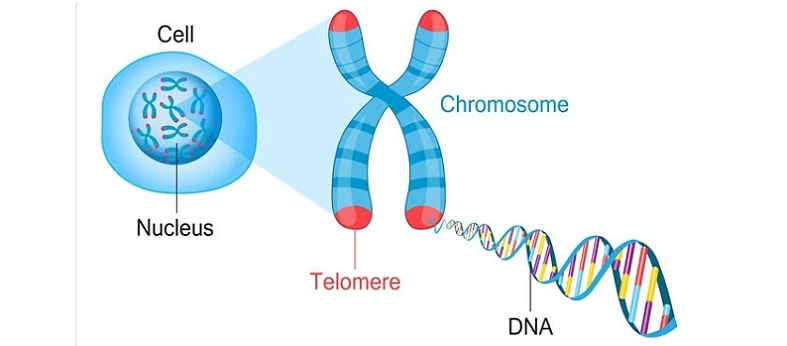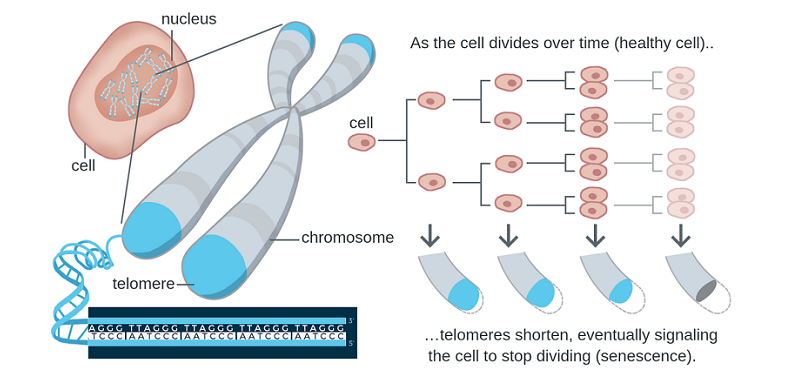
In recent years, the fascinating world of telomeres has garnered significant attention among scientists and health enthusiasts alike. Telomeres, the protective caps at the end of our chromosomes, play a crucial role in the aging process and have been linked to cognitive health. As the population ages and cognitive decline becomes a pressing concern, understanding the role of telomeres in maintaining cognitive function has never been more important.
Contents
Introduction to Telomeres and Cognitive Health
As we strive to understand the complex factors that contribute to cognitive health and aging, telomeres have emerged as an intriguing piece of the puzzle. These protective structures at the end of our chromosomes play a pivotal role in cellular aging, and recent research suggests they may also have a significant impact on cognitive function.
Definition of Telomeres
Telomeres are specialized structures found at the ends of chromosomes, composed of repetitive DNA sequences and associated proteins [1]. Their primary function is to protect the genetic material within our chromosomes from damage during cell division. As cells divide and replicate, their telomeres shorten over time. Eventually, this shortening can lead to cellular senescence, a state in which cells are no longer able to divide and may contribute to various age-related health issues.
Importance of Telomeres in Aging
The progressive shortening of telomeres has been widely recognized as a hallmark of the aging process. As telomeres shorten, cells are more likely to enter a state of senescence or experience DNA damage, which can, in turn, lead to tissue dysfunction and a decline in overall health [2]. Numerous studies have demonstrated a correlation between shorter telomeres and an increased risk for age-related diseases, such as cardiovascular disease, type 2 diabetes, and certain types of cancer.
The Link Between Telomeres and Cognitive Health
The connection between telomeres and cognitive health has become an increasingly popular area of research in recent years. A growing body of evidence suggests that shorter telomeres may be associated with cognitive decline, as well as an increased risk for neurodegenerative diseases like Alzheimer’s.
The underlying mechanisms behind this association are not yet fully understood, but it is thought that telomere shortening could contribute to the degeneration of brain cells and the subsequent decline in cognitive function. In the following sections, we will explore the relationship between telomere length and cognitive function, the role of telomerase in cognitive health, and various lifestyle factors that may influence telomere length and cognitive well-being.
Understanding the Aging Process
Aging is a multifaceted and complex process that affects every individual differently. In order to fully comprehend the role of telomeres in cognitive health and aging, it is essential to first understand the biological process of aging, cellular senescence, and how these factors relate to cognitive decline.
The Biological Process of Aging
The aging process involves a gradual decline in the function of various biological systems, which can ultimately lead to increased vulnerability to diseases and a reduced capacity for maintaining homeostasis. Several interconnected mechanisms contribute to aging, including genetic factors, accumulation of cellular damage, and changes in gene expression. Among these, telomere shortening has been identified as a key factor contributing to cellular aging and the development of age-related health issues.
Cellular Senescence and Its Impact on Health
Cellular senescence is a state in which cells lose their ability to divide and function effectively [3]. This process is triggered by a variety of factors, including telomere shortening, DNA damage, and oxidative stress. Senescent cells can accumulate in tissues and organs over time, contributing to age-related dysfunction and a decline in overall health.
Senescent cells secrete inflammatory molecules that can promote a chronic low-grade inflammation known as “inflammaging,” which has been implicated in the pathogenesis of several age-related diseases, including cognitive decline and neurodegenerative disorders.
Cognitive Decline and the Aging Brain
As we age, our brains undergo various structural and functional changes that can impact cognitive function. These changes include a reduction in brain volume, loss of synaptic connections, and decreased production of neurotransmitters, which are essential for communication between brain cells.
The accumulation of senescent cells and the resulting inflammation may contribute to the degeneration of brain tissue and the subsequent decline in cognitive performance [4]. In this context, the role of telomeres in cellular senescence and the aging process gains particular relevance, as their shortening may be associated with the cognitive decline observed in older individuals.

Telomere Length and Cognitive Function
The relationship between telomere length and cognitive function has been the focus of numerous studies in recent years. Researchers have sought to better understand how telomere shortening might contribute to cognitive decline and the development of neurodegenerative diseases.
Research on Telomere Length and Cognitive Performance
Several studies have investigated the relationship between telomere length and various aspects of cognitive function, such as memory, attention, and processing speed. Although the results are not entirely consistent, a growing body of evidence suggests that shorter telomeres are associated with poorer cognitive performance and an increased risk for cognitive decline [5]. For instance, some studies have reported that individuals with shorter telomeres exhibit reduced cognitive abilities and a higher likelihood of developing Alzheimer’s disease or other forms of dementia.
The Connection Between Telomere Shortening and Cognitive Decline
The exact mechanisms underlying the link between telomere shortening and cognitive decline remain an active area of research. However, several hypotheses have been proposed to explain this association. One possibility is that telomere shortening contributes to the degeneration of brain cells, particularly in regions associated with learning and memory.
Shorter telomeres may lead to increased cellular senescence and inflammation, which could in turn promote neurodegeneration and cognitive decline. Further research is needed to fully elucidate the relationship between telomere length and cognitive function and to determine whether interventions targeting telomere maintenance could help preserve cognitive health as we age.
Factors Influencing Telomere Length
Telomere length is influenced by a combination of genetic and environmental factors. While some individuals may have a genetic predisposition to shorter telomeres, various lifestyle factors have also been shown to impact telomere length. These include diet, physical activity, stress, sleep, and exposure to environmental toxins.

The Role of Telomerase in Cognitive Health
One of the key factors regulating telomere length and cellular aging is telomerase, an enzyme that plays a crucial role in maintaining telomere integrity.
Introduction to Telomerase
Telomerase is a specialized enzyme responsible for adding DNA sequences to the ends of telomeres, thereby preventing or even reversing telomere shortening [6]. This enzyme is active in certain cell types, such as stem cells and germ cells, but its activity is typically low or absent in most somatic cells.
The reduced activity of telomerase in somatic cells is thought to be a protective mechanism against uncontrolled cell proliferation, which could lead to the development of cancer. However, this trade-off also contributes to telomere shortening and cellular aging.
The Effect of Telomerase on Telomere Length
Research has shown that enhancing telomerase activity can prevent or even reverse telomere shortening in some cell types. This has led to the hypothesis that boosting telomerase activity might be a promising strategy for promoting cellular longevity and preventing age-related diseases.
However, increasing telomerase activity in somatic cells also raises concerns about the potential risk of promoting tumorigenesis, as cancer cells often exhibit high levels of telomerase activity. Therefore, any therapeutic approaches targeting telomerase must carefully balance the potential benefits of maintaining telomere length with the risk of promoting cancer development.
Telomerase Activation and Its Potential Benefits for Cognitive Health
Recent studies have suggested that telomerase activation might have beneficial effects on cognitive health [7]. For example, animal studies have shown that enhancing telomerase activity in the brain can improve cognitive function and promote the formation of new neurons, a process known as neurogenesis.
Some human studies have reported a positive association between telomerase activity and cognitive performance. These findings raise the possibility that interventions aimed at boosting telomerase activity could help preserve cognitive function and delay the onset of age-related cognitive decline. However, further research is needed to fully understand the potential risks and benefits of telomerase activation for cognitive health and to develop safe and effective strategies for targeting this enzyme in a therapeutic context.

Lifestyle Factors and Their Impact on Telomere Length
In addition to genetic factors, various lifestyle factors can influence telomere length and, consequently, cognitive health. By adopting certain habits and behaviors, individuals may be able to slow down the rate of telomere shortening and potentially mitigate the risk of cognitive decline.
Diet and Nutrition
A growing body of research suggests that diet and nutrition can play a significant role in determining telomere length [8]. Studies have shown that diets rich in fruits, vegetables, whole grains, and healthy fats, such as the Mediterranean diet, are associated with longer telomeres. Conversely, diets high in processed foods, sugar, and unhealthy fats have been linked to shorter telomeres.
Specific nutrients, such as omega-3 fatty acids, antioxidants, and vitamin D, have been shown to positively impact telomere length. Adopting a balanced, nutrient-dense diet may thus help preserve telomere length and support cognitive health.
Physical Activity and Exercise
Physical activity and exercise have been consistently linked to longer telomeres and better cognitive function. Regular exercise has been shown to increase telomerase activity and slow down the rate of telomere shortening, potentially delaying cellular aging. Physical activity has been found to have numerous direct benefits for brain health, such as improving blood flow, promoting neurogenesis, and reducing inflammation. Engaging in regular, moderate-intensity exercise, such as brisk walking, swimming, or yoga, may help maintain telomere length and support cognitive health as we age.
Stress Management and Mental Health
Chronic stress has been found to have detrimental effects on telomere length and cognitive function [9]. Prolonged exposure to stress can lead to increased oxidative stress and inflammation, both of which can accelerate telomere shortening. In addition, stress has been shown to negatively impact various aspects of brain health, such as reducing neurogenesis and impairing memory.
Implementing stress management techniques, such as mindfulness meditation, deep breathing exercises, or engaging in relaxing hobbies, may help reduce stress levels and preserve telomere length, ultimately supporting cognitive health.
Sleep and Its Effects on Telomere Length
Adequate sleep is essential for maintaining overall health, including cognitive function and telomere length. Studies have reported that individuals who consistently get insufficient sleep or experience poor sleep quality have shorter telomeres than those who get adequate, restful sleep.
Sleep deprivation has also been linked to increased oxidative stress and inflammation, which can contribute to telomere shortening and cognitive decline. Ensuring a regular sleep schedule, practicing good sleep hygiene, and addressing any sleep disorders may help support healthy telomere length and cognitive function.
Potential Interventions to Support Cognitive Health and Slow Aging
As our understanding of the role of telomeres in cognitive health and aging continues to evolve, researchers are exploring various interventions that may help preserve telomere length and maintain cognitive function.
Telomerase Activators
As discussed earlier, telomerase plays a critical role in maintaining telomere length and cellular health. One potential intervention for preserving cognitive health and slowing aging is the use of telomerase activators, compounds that stimulate telomerase activity.
Some natural compounds, such as astragaloside IV and cycloastragenol, derived from the Astragalus plant, have been shown to activate telomerase in laboratory settings [10]. However, the efficacy and safety of these compounds in humans remain unclear, and further research is needed to determine whether telomerase activators could be a viable therapeutic option for promoting cognitive health and longevity.
Antioxidants and Anti-Inflammatory Agents
Oxidative stress and inflammation have been implicated in both telomere shortening and cognitive decline. Therefore, interventions targeting these processes may help preserve telomere length and support cognitive health. Antioxidants, such as vitamins C and E, and anti-inflammatory agents, such as omega-3 fatty acids, have been shown to mitigate oxidative stress and inflammation, potentially slowing down the rate of telomere shortening. Including these nutrients in one’s diet or supplement regimen may help support cognitive health and slow the aging process.
Lifestyle Modifications
As we have seen throughout this article, various lifestyle factors can impact telomere length and cognitive health. Adopting healthy lifestyle habits, such as consuming a nutrient-dense diet, engaging in regular physical activity, managing stress, and ensuring adequate sleep, may help preserve telomere length and maintain cognitive function. In addition to these practices, other lifestyle modifications, such as avoiding exposure to environmental toxins and practicing good dental hygiene, may further support cognitive health and slow down the aging process.
Future Research and Therapeutic Approaches
The field of telomere research is constantly evolving, and novel therapeutic approaches targeting telomeres and telomerase are continually being explored. As our understanding of the role of telomeres in cognitive health and aging grows, we can expect to see the development of more targeted and effective interventions for preserving cognitive function and promoting healthy aging.
Future research should focus on identifying safe and effective strategies for maintaining telomere length, understanding the complex interplay between genetic and environmental factors, and investigating the potential benefits of telomere-targeted therapies for cognitive health and longevity.
References
[1] Telomeres and telomerase: three decades of progress
[2] Are Telomeres the Key to Aging and Cancer
[3] Are these tiny segments of DNA the key to ageing?
[4] Chapter One – Telomere and Telomerase Biology
[5] Telomere Length as a Marker of Biological Age: State-of-the-Art, Open Issues, and Future Perspectives
[6] Telomeres and Telomerase: A Simple Picture Becomes Complex
[7] Telomeres and Telomere Length: A General Overview
[8] Telomeres, Telomerase and Cancer
[9] How Excessive Screen Time Affects Cognitive Health in Adults
[10] Telomere extension turns back aging clock in cultured human cells

